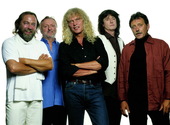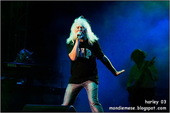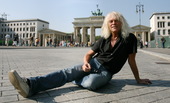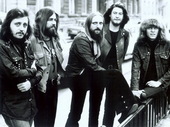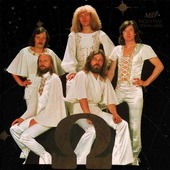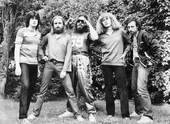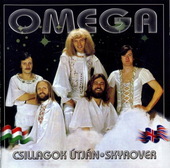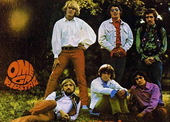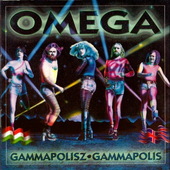Omega
On The Eve Of Golden Jubilee
28.01.2011
Архив интервью | Русская версияHonestly speaking, until December 2010 we were convinced that classic rock music from Eastern Europe was of no interest to Russian record labels, as only a handful of old-timers still remember great bands from Hungary, Poland and Yugoslavia that were massive over here in the 70s and 80s. But all of a sudden, a press release from Soyuz Music dropped into our mailboxes, indicating that they are releasing a new album by Omega, probably the best Hungarian rock band ever, which also happens to be one of our all-time favorites. Almost hopelessly, we asked whether there were interview opportunities, but talking to somebody from Omega still seemed to us an unrealistic highlight, given the band’s status of national heroes in their home country and our status of an underground specialized webzine. And then, to our great surprise, came this e-mail with an interview date and the phone number of Janos Kobor, Omega’s irreplaceable singer who formed this band nearly 50 years ago. Over this incredibly long period of time Omega have seen nearly everything that may happen to a person and musician – the rise and fall of political regimes, the highs and lows of music styles and rock in general, chart-topping releases and departures of key members. What’s more, Omega have seen their song, “Gyonghaju Lany” from their second album “Tizezer Lepes” (1968), becoming a household hit all over the globe 25 years after its creation, only its name was different this time around (“White Dove”), and it was performed by another band (Scorpions). On Omega’s latest album, “Rhapsody”, you will not find “Gyonghaju Lany”, but if you’re a grey-haired music listener, you will definitely recognize a plethora of other familiar tunes, as the CD is comprised of Omega hits from the past four decades performed with a symphonic orchestra. A nice refresher for those who still have Omega vinyls in their collection, and the shortest path towards getting into the band for those who have never heard it before.
What is “Omega Rhapsody” - your solo album or a band release? Not all the Omega musicians are playing here, but all of the songs are from Omega albums…
Originally the idea of trying to play our songs with a big orchestra was not mine, but in the earlier times there was no possibility to do it – neither technically, nor time-wise. We never had a possibility to make a correct recording with a symphonic orchestra. Once in the mid-70s we made “Suite”, but it was not a big success for us. For the fans it was not bad, but we realized at that time that technically we can’t make it. About one year ago I though that maybe now is the time to try it out. But I didn’t know how it will happen, whether I would succeed or not. That’s why I decided first it make it as a solo album, but when it was ready and we were showing it to English producers and sound engineer, they told us that it was quite the high British standard, and that was the end of it for me as a solo album. Of course, it’s an Omega product, but in the beginning I was a bit afraid of how it will turn out.
How did you choose the songs for “Rhapsody”? What were the criteria that you used?
The songs that I chose were not the biggest hits. When I hear an old Rolling Stones song, I want to hear it as it was made at that time, for example, “Satisfaction” from 1965 – it brings out the emotion and the soul when you hear it as it was originally recorded. The songs that I chose were mainly from our progressive times, from the mid-70s till nowadays, and those are the songs that I thought were really good for trying them with a big symphonic orchestra. First I chose 30 songs, and at the end these 18 remained.
You worked with Edwin Balogh once again for this album. You first worked with him on the “Transcendent” album in 1996, and back then it was really surprising to hear Omega with a different lead vocalist. Can you say a few words about how you originally met him and got this idea to do an Omega album with another singer?
We have always been making changes in our style over these near 50 years that we are playing together, and every five years we are coming up with new ideas, a new style. In the beginning we were playing beat, later on – hard rock, then space rock, then so called total rock, so we always changed when we were bored with what were doing, or we were not satisfied with what we were doing. In the mid-90s I thought that after our space period, when we made such albums as “Csillagok Utjan” (1978) and “Gammapolisz” (1979), we had to be a bit harder. Not heavy metal, but a little bit harder than we were at that moment. I heard that Tamas Szekeres, who had been playing guitar with us for a few years, had a band where Edwin was singing. We first made a demo to try out how it will sound when he songs our songs in English, and I really liked it, so we made an English version of our Hungarian album “Trans And Dance” (1995). But for other members of the band it was not real Omega, that’s why we didn’t continue in this style back then. But I was always thinking of somehow involving Edwin, Tamas Szekeres and other good musicians and singers in our product.
We have heard that you are planning to present “Rhapsody” on stage. Will it be with the regular Omega line-up, or with some other musicians?
Of course, I want to do everything with Omega, because I have no idea how to play a concert as something else than Omega. It will also be an Omega project, but not as easy as the others, because we need a big orchestra, and it’s not possible to do it with just five members of the original group. On the other side, I don’t want to leave out the other guys who were participating in the recordings, because they did a really nice job. I think that Tamas Szekeres and Zsolt Gomory (keyboards) must anyway be involved. At the same time, there are two Omega members that did not participate in these recordings. They are also busy with something, Tamas Mihaly (bass) is writing a new musical, and Gyorgy Molnar (guitar) is also doing something, so we decided that with “Rhapsody” we are making a break for the original group, because we need the time to prepare for our 50th anniversary year concerts and, of course, a new album.
“Rhapsody” is released by German label Edel Records. Does it mean that you will play more concerts outside Hungary in support of it?
For the 50th anniversary we plan a big tour, not only in Hungary but all over the world, where we have the possibility to play. We will play many places where we haven’t played for 20 years, which means that we are planning to play in Germany, the Netherlands, France, Scandinavia, of course, the neighboring lands, and I hope that somehow we can get to Russia as well. We have never played in Russia so far.
It would be really fantastic to see you in Russia! We are looking forward to it!
Two or three years ago we were very close to it. We were invited to play in Moscow on September 2, the Day of Moscow, but some technical problems and other things did not make it happen. Actually, it was too late when they were beginning to organize it. As far as I know, behind this concert was Luzhkov, who is not the mayor of Moscow anymore, and that may mean that this project will be impossible to realize now. Anyway, we are making some contacts to present “Rhapsody” in a big theater, such as the Budapest Opera House. I don’t think it will be possible in the Bolshoi, but maybe in another opera theater of that kind.
About 10 years ago we saw billboards around Moscow, which said that Omega and Locomotiv GT together with some other bands will come to Russia, but not to play music. You were supposed to play soccer for some charity event. Do you remember anything about that? Were you indeed invited?
(laughs) As for us, I can imagine us playing soccer, but as for Locomotiv GT, I don’t really think they can play. Maybe Tamas (Somlo, bass, vocals) will.
Actually there are a lot of things that are unclear about Omega, maybe some of them are just rumors. Therefore we would like to ask you a few questions about such things, to make them finally clear. For instance, you said that Omega have never played in Russia. But a lot of people believe that the song “Lena” (off 1978’s “Csillagok Utjan”) was written when you were touring Siberia. What is the real story behind this song?
The feeling of Russia is always on our minds. Of course, it’s unusual for us when some other countries are much bigger than ours. I saw Siberia only once, when I was flying from Moscow to Tokyo, and it was something incredible to see. In our minds we always had it, and that’s why this idea came to make this song… I can’t describe it in words, but we felt something when we were playing this song. Originally its title was “Russian Winter”, but at that time Hungarian authorities told us, “What does it mean – Russian Winter? There is nothing like that. Soviet Winter – that may be! (everybody laughs) But “Russian Winter” is not acceptable”. That’s why the title was changed to “Lena”, and only the English version remains to be called “Russian Winter”.
We have seen your DVD filmed in 2004, and we were really impressed by it. How do you manage to keep yourself in such a good shape – both physically and vocally?
Vocally - it’s not a problem (laughs), because my voice is not a special big voice, but I have managed to keep this voice until this time. Physically - it’s another thing. Really I can’t imagine how I do it, but I think it’s because when I was young, 15-16 years old, I was an athlete, I was running a 100-m hurdle. I went for it very seriously, I wanted to be an Olympic champion, but later on I realized that maybe I could become a champion of Hungary, but not an Olympic champion. For me it was not enough, that’s why I stopped doing it, but the basis that it gave me helps me a lot now.
Omega have played in the same line-up for nearly four decades. What is your secret of stability? How do you avoid personal and musical conflicts?
We cannot avoid them, but we settle them somehow. It was not always very easy, but somehow we always succeeded. Now that we are a bit older, problems are sometimes a bit more serious, but still so far we have managed to dissolve the biggest problems.
When and how did you get to know Scorpions? We heard that you toured together, but when did it happen?
In the first half of the 70s we toured Europe a lot – France, Belgium, the Netherlands, Germany, Switzerland. We played… well, not maybe 100, but 60 concerts together. Our friendship began at that time, and later on we would often meet at some festival. We were always happy to invite each other at big concerts. They covered a song of ours, and we also plan to do the same. The big difference between the two bands has always been that they only started from West Germany, and we always had to come back to Hungary. That’s why we can’t imagine for ourselves the success they made in Japan and the United States. For us it was nearly impossible.
How do you feel about Scorpions being so successful with “White Dove”, and about the fact that many people don’t even know who originally performed the song?
As they were more known internationally than we were, so it was for us acceptable, we thought that maybe it would help us sell more copies. When Klaus Meine (Scorpions singer) told me that they’ll do it, we accepted it and we were very happy – why not? Personally for me it’s not a bad version, but there are some members of the band, especially Gabor Presser (then-keyboardist and author of the song), who were not satisfied with this version.
Yeah, it’s played simpler than they way you do it with Omega…
Yeah, but a good song must be good on a guitar alone, and not only after all the instruments and arrangements are added. I think “White Dove” or “Gyonghaju Lany” can be great just on one guitar. For me it was quite different, but I like it, too.
You have probably answered this question a million times, but can you tell us the story how in the early 70s you parted ways with Gabor Presser and Jozsef Laux (drums) , who went on to form Locomotiv GT? We have heard many crazy stories about this split…
It’s very simple. Omega was originally formed as a school band by five schoolboys who were not really into music. The other guys and I never studied any music at that time, we only wanted to set up a hobby band for ourselves. Later on, five or six years later, when many people got to know us, and they wanted more and more of our own songs, we needed some help from really trained musicians. Tamas Mihaly and Gabor Presser joined us in 1966-1967, and it was a big help for us in improving music, but when it comes to style, we were never following the same way, I think. They always wanted a bit complicated, musically richer thing, and we always wanted to play simple rock. It was not a problem in the first four or five years, but after we had really big success abroad, our view and Gabor Presser’s view turned out to be in absolutely different directions. We wanted to pursue the style that Deep Purple, Uriah Heep, Pink Floyd played at that time, and they were closer to American, nearly jazz rock style.
Actually in Russia we have heard a very different and a much wilder story. Allegedly the Hungarian government wanted to have the best rock musicians of the country in one band, and that’s why Gabor Presser and Joszef Lauz were removed from Omega and put in a different group…
That’s right, Omega was never really accepted – not by the government, but by the cultural authorities. (laughs) They never liked us. Maybe they didn’t really want to disturb this group, but when they heard that Gabor wanted some changes in Omega – because that was the first plan: to make some changes in Omega – they decided to collect all the best musicians in one group. That meant that in the next three years we were not allowed to step into Hungarian recording companies’ studios. That’s why we made the fourth, fifth and sixth album on our own at home with tape machines.
You worked with Gabor Presser again on the “Trans And Dance” album. How was it like, and why didn’t he stay with Omega longer?
I think Gabor is a really big persona. From the 80s it was very clear that he will do something alone. It was not only happening with Locomotiv GT, but in all the big groups except Omega, the main person of the group – the vocalist, the composer and so on – was making a career without the group. Gabor did this, and also Demjen, Zoran, and so on. For us it was never an option, none of us wanted to go on alone. Our group was always a team, and nobody wanted a way apart from the others.
What are Anna Adamis (lyricist on the first three Omega albums) and Jozsef Laux now doing? Did they do anything musically since their departure from Locomotiv GT?
Tamas Barta (guitar) was the first to leave Locomotiv GT. And Joszef always wanted to live in the West, so of course, it was the next step. After he left Locomotiv GT, it was clear that Anna Adamis cannot be the lyric writer for Locomotiv GT anymore (she was married to Jozsef – ed.). Since then Joszef has never really drummed in a big band. He made some solo things, but no big success was coming to him. Anna did write songs for other musicians and group, but she was not successful either. The last time I saw her at our concert in Budapest in June, when we were playing with Deep Purple and The Animals. She was in the dressing room and she was very happy to meet us, but she told me that she writes no songs anymore, and hasn’t written anything for five or six years. Jozsef is living in Budapest now, he is releasing some books, but really I don’t know what he is doing.
By the way, Omega have always worked with lyric writers who are not band members –Anna Adamis, Peter Silyi, Gabor Varszegi. Can you say a few words about these people? Are they poets? What do they do apart from cooperating with Omega?
With Anna Adamis, I think, the situation is clear. Gabor Varszegi was a former bass player in the band Gemini. Later on he became one of the richest men in Hungary, something like Roman Abramovich. (everybody laughs) Of course, he was not as rich, the difference was as big as between FC Chelsea and MTK-Hungaria. But he’s a really rich man, a typical businessman. For him working on “Omega Rhapsody” was a nice look back at the times when he wrote some texts for us, but now he is totally distanced from this and concentrating on the business.
We have read in a recent interview that you personally never use airplanes and only travel by ground. What is the reason? Did you have any negative experience while flying?
Yes, of course! In the 70s I was flying a lot to England, to Japan, and though I can’t say I really loved to fly, it was not a problem. The turning point when I decided not to fly anymore came when we were flying to Tokyo through Moscow. About half of the way from Budapest to Moscow, somewhere above Kiev we had an accident. Our only luck that it was not a Hungarian plane, but a Russian one. The Russian pilot was very good and he managed to land the airplane somehow. Then I decided, as Charlie Chaplin said in “The Great Dictator”, “It’s far from perfect”. From that moment on, if I can make it to my destination on the ground, I don’t fly.
We’ve noticed an interesting thing – the rock scene in Hungary was very active when the Socialist government was holding it down in many ways. It is logical to expect that when the Iron Curtain fell down, the scene would really explode and Hungarian bands would become much more famous all over the world. But it never happened. On the contrary, many bands even slowed down or fell apart in the 90s. In your opinion, what are the reasons?
It’s very hard to say. In my opinion, Hungarian bands were not better than other bands in the rest of Europe. Maybe in Hungary they had a bit more freedom than in Czechoslovakia, Russia or Poland. In Czechoslovakia it was nearly impossible to play as a rock group. I knew a lot of good band, but they had no possibility to play to bigger audiences and so on. We had more chances, but I’m not sure that Hungarian groups were better than other bands on this continent, it’s just that the possibilities were bigger for them. When the possibilities became equal for everybody, then came the reality. For example, Hungarian bands were playing a lot in Poland, but in the 90s when every English or Polish band also could arrange big concerts there, Hungarian bands were not interesting that much anymore. The best bands were nearing their end and they were not playing in the 90s, and the new groups were not better than other bands in the rest of Europe.
What do you think of the current Hungarian rock scene? Can you name a few younger Hungarian bands that you really like?
Sometimes I listen to the Hungarian radio, but I don’t go to see live concerts. Of course, there are some really interesting bands, but I must say that such bands exist all over Europe. I can’t mention a really special, a really good band.
We have heard that in addition to “Omega Rhapsody”, you are planning to release an album called “Omega Symphony”. Can you say a few words about it?
“Rhapsody” is only 70 minutes long, because the CD playing time is limited, and for a concert we need a 2-2.5 hour program. “Symphony” will be the first part of this Omega Philharmonic Concert, there will be no vocals on it and no drums, and the biggest Omega songs will be played in symphonic versions. And in the middle of this concert we will switch to “Rhapsody”.
Do you already have recording plans or a release date for “Symphony”?
“Rhapsody” is now out in the international version, half-English and half-Hungarian. A totally Hungarian version will be released as a double-CD pack soon. It will include “Symphony” and will be called “Omega Philharmony”. It is supposed to come out in late February or March.
Do you already have any specific plans for celebration of the band’s 50th anniversary? What about a joint anniversary concert with the Rolling Stones?
(laughs) For us it would be a great pleasure, of course, but they also have their own problems in the band and outside the band. It’s clear that they are also planning a jubilee tour, so it will be a very nice thing to meet somehow. But I can’t say for sure. Now our producer is going to London, he wants to invite some big friends of ours from the past for the recording of our next album, not “Symphony”, but the anniversary album. There are negotiations to engage Ken Hensley from Uriah Heep, Keith Emerson, Brian May, and, of course, Scorpions. We want to do this recording from March to June. In the summer we will make some big concerts with “Rhapsody”, and when you have time, we invite you!
Thank you very much! Janos, for us it’s really a big honor for us to be doing this interview!
You are welcome. One problem is that my Russian is not as good as it used to be when I was young. I was really very good at Russian. When I read something, I still understand everything, but to speak, I will have to think about every word. I have the same problem with English, because I often speak German, and when a word comes, it comes first in Hungarian, second in German, and then I have to think about this word in English.
Omega on the Internet: http://www.omega.hu/
Special thanks to Maxim Bylkin (Soyuz Music) for arranging this interview
Roman Patrashov, Natalie “Snakeheart” Patrashova
December 13, 2010
© HeadBanger.ru
